| Srl | Item |
| 1 |
ID:
089127
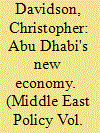

|
|
|
|
|
| Publication |
2009.
|
| Summary/Abstract |
At the helm of the United Arab Emirates federation, Abu Dhabi powered into the twenty-first century on the back of ever-increasing oil revenues, well-established petrochemical industries, and massive oil-financed overseas investments.
|
|
|
|
|
|
|
|
|
|
|
|
|
|
|
|
| 2 |
ID:
072488
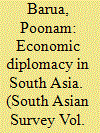

|
|
|
|
|
| Publication |
2006.
|
| Summary/Abstract |
'Economic diplomacy' can serve to open avenues for testing new tracks for business relationships that can deliver a peace dividend. A successful business performance will be defined by new variables such as best business practices, innovation, R&D and cross-cultural skills, which will in turn help in engaging new stakeholders in diverse areas of cooperation. The South Asian and world economic community seems to be working on a set of myths with respect to Indo-Pakistan relations, which are inconsistent with the evidence at hand. The South Asian business community as a whole has always been ahead of its governments in giving support to economic confidence-building measures and doing business where prospects for profits have looked bright and feasible. 'Strategic philanthropy' by corporates is giving rise to new trends in corporate citizenship. This may be the best timing for corporates in South Asia to recognise that reducing political tensions and security risks in the region can have a profound long-term impact on their businesses.
|
|
|
|
|
|
|
|
|
|
|
|
|
|
|
|
| 3 |
ID:
061202
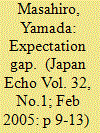

|
|
|
| 4 |
ID:
149638
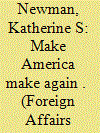

|
|
|
|
|
| Summary/Abstract |
Despite their many differences, the major candidates in the 2016 U.S. presidential election managed to agree on at least one thing: manufacturing jobs must return to the United States. Last April, the Democratic contender Hillary Clinton told a crowd [1] in Michigan, “We are builders, and we need to get back to building!” Her opponent in the Democratic primaries, Senator Bernie Sanders, said the manufacturing sector “must be rebuilt to expand the middle class.
|
|
|
|
|
|
|
|
|
|
|
|
|
|
|
|
| 5 |
ID:
062770


|
|
|
|
|
| Publication |
Berkeley, University of California Press, 2005.
|
| Description |
xx, 397p.pbk
|
| Standard Number |
0520244192
|
|
|
|
|
|
|
|
|
|
|
|
Copies: C:1/I:0,R:0,Q:0
Circulation
| Accession# | Call# | Current Location | Status | Policy | Location |
| 049770 | 951.73/ROS 049770 | Main | On Shelf | General | |
|
|
|
|
| 6 |
ID:
067367
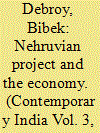

|
|
|
| 7 |
ID:
017577
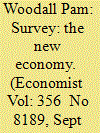

|
|
|
|
|
| Publication |
Sept 23, 2000.
|
| Description |
After page 72
|
|
|
|
|
|
|
|
|
|
|
|
|
|
|
|
| 8 |
ID:
162604
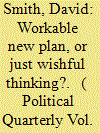

|
|
|
|
|
| Summary/Abstract |
There are large parts of the Commission on Economic Justice's diagnosis that are unanswerable. There are some good ideas in the report, but some seem seriously misguided. There is a strong sense, as in other reports, of ‘industry good, finance bad’. The Commission says that the aim of its report is to ‘spark a national conversation on why we need a change of direction, and what that direction should be’. Such a conversation is needed, at this time more than most others, and so it has succeeded in that respect.
|
|
|
|
|
|
|
|
|
|
|
|
|
|
|
|